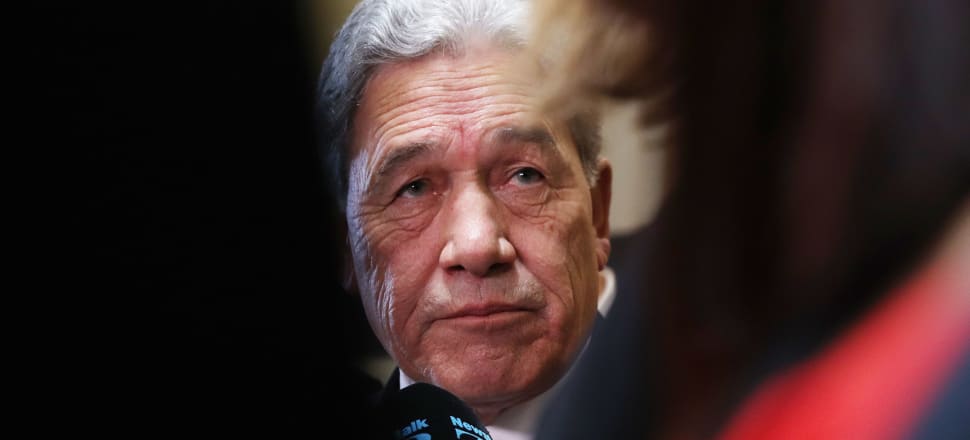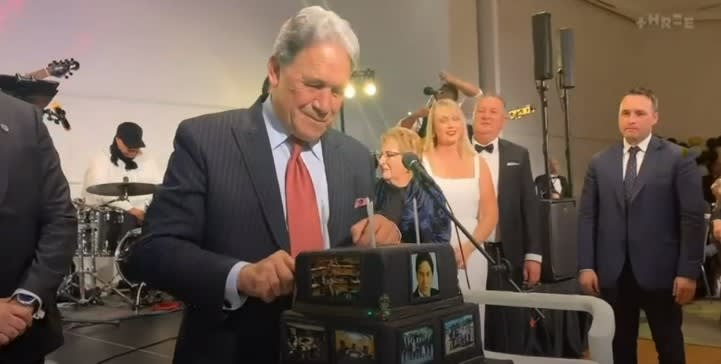
Winston Peters rides again, embracing high octane social fights and promising GST off foods, a new drug-buying agency and 'common sense'. Tim Murphy reports.
It was the word, the problem, that launched a thousand New Zealand First campaigns – but economic reality and new bogeymen have consigned 'immigration' to Winston Peters' history.
Not once in a 40-minute speech to launch the party's 2023 election campaign did leader Winston Peters mention the words immigration, immigrants or what in the past year has been a near-record number of people arriving in New Zealand to work.
The labour market shortages caused by Covid's closed borders have shown up severe restrictions on migration for the damage they can cause to the country's industries and economic growth.
In any case, Peters has pivoted NZ First away from migrants and found new concerns, new perceived threats that his party will now focus on stopping: separatism, "secret social engineering" and ideological experiments.
He promises to stop New Zealanders "being mandated out of existence" and to defend their right to disagree with a government and not be punished.
His party has picked up candidates from the group Hobson's Pledge, which opposes racial 'separatism', and an anti-vax doctor. The biggest audience applause through the speech was when Peters pledged to halt the woke agenda, "restore education and stop indoctrination."
Despite, or because of, these current itches that New Zealand First will scratch over the next 80 days, Peters is adopting a mantra that became synonymous with his old foe, United Future leader Peter Dunne.
In multiple points of his presentation he used the term "common sense" and even declared New Zealand First the "common sense party".
Dunne's bow tie would be spinning at the gall of it.
In a speech peppered with his cliches and anecdotes of old, and his admiration for countries like Norway, Singapore and Ireland, the 78-year-old Peters repeatedly held up the "old fashioned way" as the way forward.
"And what some of these experts don’t like, is being reminded that when we were number one in the world most of the politicians then had never been to university. They gaslight such success as 'nostalgia'.
"Longing for a past that they say is no longer possible. Well, we say it is possible again – but not with your policies."

As well as pushing back against what he called racism and separatism, and "a small unelected cabal of opinionated virtue signallers" trying to socially engineer education, health and democracy in general, Peters set out areas his party would be known for.
"New Zealand First is the 'Health Party'," he said, and then ran through sections of policy giving its other pseudonyms "... the 'Education Party'... the 'Sound Economics Party' ... the 'Law and Order Party' ... the 'One Standard of Citizenship Party' ... the 'Common Sense Party' ... the 'Standing up for Seniors Party'."
New policies NZ First would try to advance included unspecified tax incentives for added value before exports, the IT industry and productivity.
It wants to remove GST from fresh food, vegetables, fruit, meat, dairy and fish. "We challenge the tax purists, to explain why other First World countries can do this, and we can’t."
And it would ensure tax income brackets are adjusted for inflation.
On health, Peters said wasteful spending in other areas of government (he nominated the Auckland Light Rail project and used the upper limit of its urban development projects' possible total cost of $29 billion) would be redirected to cutting waiting times, employing and paying medical staff well.
The party would reform the Pharmac system for purchasing medicines and treatments, and boost its replacement with a doubling of funding from $1.2b to $2.5b a year.
"New Zealand First believes that New Zealand has long had inferior First World pharmaceutical delivery... All the other political parties believe in the Pharmac model; we don’t, because we don’t believe in fobbing off political responsibility."
On law and order, the party has previously announced it would declare gangs to be terrorist organisations and the conference pushed for a separate, gangs-only prison.
Peters derided those who would ask which major party, Labour or National, NZ First might side with if elected but said the country needed a change of government.
"New Zealand is at an inflection point and a change in government is critical.
"But it must be for a much better government and not just ‘It’s our turn now’. You’re entitled to ask them 'Your turn to do exactly what?'
"And one thing that the last three years has proven is that certainty, common sense, and experience, is critical to good government. On their own the Labour Party has proven an utter mess."
He was more opaque about National, or a centre-right grouping, claiming "they" had never had a minister inside Cabinet, perhaps forgetting one Judith Collins and others like Todd McClay, Paul Goldsmith, Michael Woodhouse and Gerry Brownlee.
"And looking across the political divide ask yourself this question, “Is this their first rodeo?” Because for many it is. They have never had a minister inside of Cabinet. They will need our certainty, our common sense, and our experience."
He was both proud of and suspicious of the term handbrake applied to the effect NZ First had on Labour's first term between 2017 and 2020. He promised a turbo charger for the positive and a handbrake for the negative under any future arrangement.
In some ways, the Peters party giving a home for some elements of the anti-separatism, anti-woke, anti-mandate and anti-elite groupings so active in 2023 could be a good thing – with an experienced politician able to soak up their votes, give them a venting vehicle and then slowly apply the handbrake to their extremes. A party where bad ideas go to be slow-timed and disappeared.
Peters had a few digs at others, including one for the former workplace and immigration minister Michael Wood, who resigned after failing to declare shareholdings.
Parliament, he said, used to be full of practical people, "not university union politicians who wouldn’t know a real worker if they fell over one, and don’t know how to fill out a simple ‘profit and loss’ account, or ‘pecuniary interest form’."
Which might have contained an element of projection, given Peters' own personal failing to fill out properly his application for national superannuation, resulting in overpayment of $18,000 over seven years and a prolonged legal case in which he laid the blame on a Ministry of Social Development staff member's advice or checking.
He wound up the two-day convention saying this was the most important election of the audience members' lifetimes.
They always are. When you are near the end of your political career every poll could be the last chance saloon.







